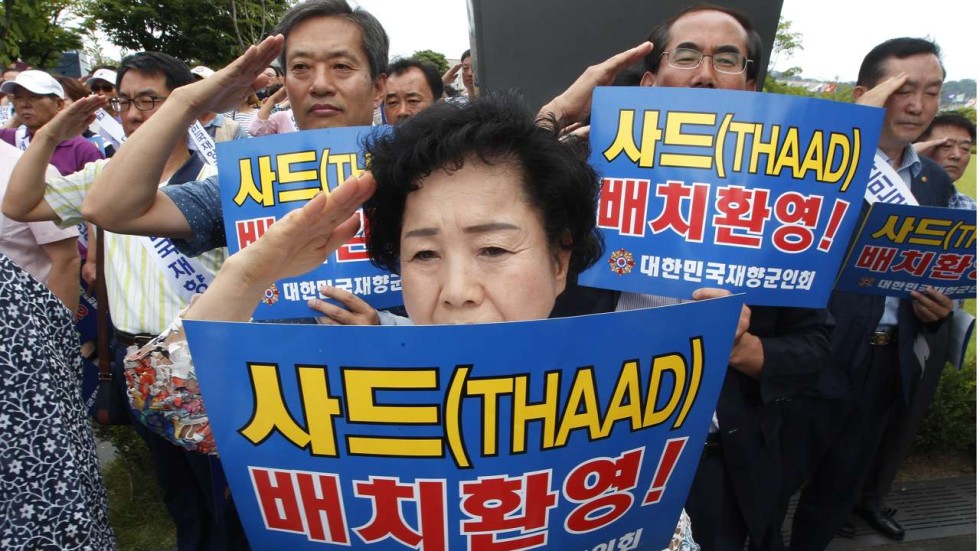SEOUL, Aug. 2 (Xinhua) — South Korea has lost and will lose much of its diplomatic clout in Northeast Asia, which it needs to deal with the Democratic People's Republic of Korea (DPRK)'s nuclear issue, as Seoul agreed with Washington to deploy a U.S. missile defense system on its soil, a former South Korean unification minister said Monday.
"There's no diplomatic consideration found in the Republic of Korea (ROK)'s (foreign) policy," Jeong Se-hyun, who served as unification minister for two and a half years from 2002, said in an interview with Xinhua.
He made the comments when explaining his opposition to the deployment of Terminal High Altitude Area Defense (THAAD) in his homeland.
Seoul and Washington abruptly announced a decision in July to install one THAAD battery in Seongju county, some 250 km southeast of the capital, by the end of next year, defying strong objections from its neighboring countries.
The government, Jeong said, never considered diplomatic gains and losses from the deployment decision, which he expected would put South Korea in a very difficult situation in exercising diplomacy and denuclearizing the Korean Peninsula as China and Russia strongly oppose THAAD in South Korea.
"THAAD will be deployed as the U.S. needs it. (South) Korea and the U.S. claim it can defend against North Korea (DPRK)'s nuclear and missile threats, but the claim is just a superficial justification. The strategic and actual goal is to supervise and check military forces in China and the far eastern region of Russia," said Jeong, who has served as unification minister under the two previous governments of late presidents Kim Dae-jung and Roh Moo-hyun.
THAAD's X-band radar damages the security interests of China and Russia as it can peer into Chinese and Russian territories. Seoul said it will adopt the terminal mode radar with a detectable range of 600-800 km, but it can be converted at any time into a forward-based mode that can range at least 2,000 km. The radar's modified version reportedly does not even need the conversion, detecting as far as 3,000-4,000 km.
The THAAD battery set to be deployed on South Korean soil will be operated by U.S. Forces Korea (USFK), which Jeong said means a U.S. action to militarily maintain its "dominant position and hegemony" in East Asia that Washington has enjoyed since the end of World War II.
The U.S. anti-missile system is incapable of intercepting all of the DPRK's missiles, Jeong said, as the DPRK military allegedly has more than 1,000 missiles targeting South Korea. THAAD is composed of 48 interceptors, six mobile launchers, an X-band radar and fire control system.
Seoul and its adjacent metropolitan area will be excluded from the THAAD coverage as it is set to be installed in the country's southeast region, which the former unification minister said is clear evidence to support the claim that THAAD is not aimed at protecting South Korea from the DPRK's nuclear and missile threats.
South Korea's military said the capital Seoul and its adjacent region will be protected by U.S. Patriot interceptors that can shoot down missiles at an altitude of 15-30 km. THAAD is designed to intercept missiles at an altitude of 40-150 km, while DPRK missiles travel at a lower altitude of 20-30 km.
It is natural for China and Russia to oppose the THAAD deployment in South Korea as it aims not to intercept DPRK missiles, but to supervise Chinese and Russian territories, said the former unification minister.
"Where is there any fool to believe the claim that the THAAD radar targets North Korea (DPRK) alone? Who could know what happens inside the U.S. base where the THAAD battery is deployed? The core (of the THAAD deployment) is aimed at supervising China and Russia, not at interception," Jeong said.
Jeong said the THAAD deployment is not in South Korea's national interests as it causes more losses than gains diplomatically and economically and that the deployment decision was made due to U.S. pressure. It is an explicit failure of foreign policy under the Park Geun-hye government, he said.
The THAAD deployment is expected to make it hard for South Korea to obtain diplomatic cooperation from China and Russia in pursuing President Park's regional policies like the Eurasia initiative and the initiative for peace and cooperation in Northeast Asia.
The goal of denuclearizing the Korean Peninsula will be made difficult to achieve due to the expected reluctance from China and Russia to cooperate with South Korea, Jeong said.
Jeong said Park used "flamboyant rhetoric" to refer to the trust-building process on the Korean Peninsula and reunification "bonanza" in her early tenure to explain her DPRK policy.
But, her real intention proved to be the DPRK's collapse, he said, as could be seen in her super hardline policies such as the shutdown of Kaesong Industrial Complex, one of the few remaining inter-Korean economic cooperation projects, and the resumption of propaganda broadcasts with loudspeakers in the frontline army units.
The super hardline policy led South Korea to be caught in a snare set by the United States, which Jeong said means the U.S. military strategy in East Asia of observing and pressuring China and Russia together with South Korea and Japan.
"The Park Geun-hye government can no longer use a word of foreign policy. The super hardline policy toward North Korea (DPRK) results in (South) Korea being trapped in the U.S. strategy in East Asia. The government didn't consider the worsening of (South) Korea-China relations (in its THAAD deployment decision)," Jeong said.
Jeong predicted that South Korea's economy will take a direct hit with the THAAD deployment as the number of Chinese tourists visiting South Korea is expected to decline. Moreover, trade is projected to fall between China and South Korea, which heavily depends on the world's second-largest economy for exports, as China is South Korea's largest trading partner.
